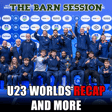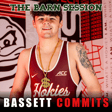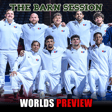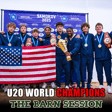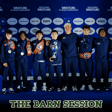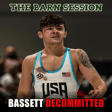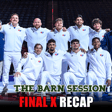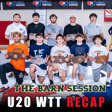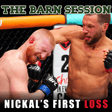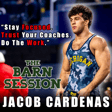Become a Creator today!Start creating today - Share your story with the world!
Start for free
00:00:00
00:00:01

Session 72 - Chris Foca on His All-American Journey, Toughest Challenges & More
Chris Foca joins the podcast to talk about his experience in wrestling, from youth to today. With lessons learned, goals accomplished, and memories made, Chris talks about the highs and lows of his time within the sport and what he's looking forward to in the sport. We talk about mindset, the ever shifting college wrestling landscape, and taste in music. Chris has a very unique take on the sport and is a treat for the sport!
Transcript
Introduction and Special Episode Announcement
00:00:01
Speaker
All right, welcome back everybody to another episode of the Bar in Session podcast. a A little bit of a different episode today. We got a guest. going to do a little bit of an interview here. It's two-time All-American Chris Volka out of Cornell.
Chris Volka's Wrestling Journey Begins
00:00:13
Speaker
Chris, how you doing? Doing good. Glad to be on this interview. Yeah. podcast yeah Yeah. um So weve you know we've known each other for for a few years now. My memory is...
00:00:25
Speaker
my memory is Well, it starts with you teching me at Super 32 and then again at at Journeyman. And then a couple of years later, you come on a visit to Cornell after I. Were you at the time committed to Iowa State or you had committed?
00:00:45
Speaker
Yeah. Yeah. yeah And then you came on a visit and you were, I think you were Andrew Berryessa was your host. I think. It was Furman. It was Furman. Furman was Furman.
00:00:57
Speaker
Furman. You got put with Furman. Uh-huh. That's no wonder you committed. Uh-huh. Obviously. You did a hell of a job. Hey, no, no kidding. So yeah, two-time All-American.
Achievements and Challenges in College Wrestling
00:01:09
Speaker
you know How do you feel about your career with how it wrapped up and and yeah, how at least with the college side of things? yeah How did you feel things went for you? I feel peace with how it ended. um Obviously, you go into college wanting to be a national champ, wanting to be a multiple time national champ. And um obviously, it takes a kind of person to do that. And you don't just walk in and do that. so um Yeah, you know, ah started out my freshman year.
00:01:40
Speaker
ae started off pretty hot. Honestly, I was i was a top 10 guy. Battled some injuries at the tournament that I wanted. Came back the the next year and hit it as hard as I could. I wanted to prove everybody wrong and ended up with the with the bronze.
00:01:54
Speaker
and Yeah. Junior year, i was ah ah went up a little too late in the season, so I never put this eyes on. I was battling guys that I just couldn't really move around and made a pretty deep run in the tournament. I mean, I made the round of 12, but obviously that heartbreak stuck with me all year because didn't want to feel bad again. and and then This year was just different. This year I didn't care if I won or lost.
00:02:20
Speaker
And I when I was talking to the coaches, the team and and the sports like guys, that's pretty much what I was preaching. It's like as crazy as it sounds, I'm at peace with the fact that I might lose matches like it just doesn't matter to me. And yeah ah the turning point was going into nationals, fully believing that I'm going to win and being like, hey, like on my best weekend, I know I could win.
00:02:43
Speaker
And when it came down to it, If you look at the difference in score between the top placer and the sixth placer, we were all within three points of each other. So in another life, I win the tournament. I know that for a fact.
00:02:58
Speaker
If my weekend pans out the way that ah that it could, that's what happens. But um yeah, I just wrestled as hard as I possibly could. Went into every match with a huge smile on my face because I looked at it as a blessing to be there. I wasn't so really...
00:03:13
Speaker
I wasn't caught up in the in the hoopla and the media and stressing myself out. Oh, like this is the round of 12. Like if I win this, I'm an all American. Like, no, I went into
Reflecting on College and Future Prospects
00:03:21
Speaker
every single match. It's like, all right, like let's do it.
00:03:23
Speaker
Like let's have a good time. was eating before every match. And then, yeah, I mean, after every, after every win, I was, I was happy go lucky. every After every loss, I was happy go lucky.
00:03:34
Speaker
I even, I, McAnally beat me in the quarters and I wished him good luck. Like on the mat, like, Hey, like, go get it, man. Like, yeah I was just happy to be there. And, Yeah, and when it when it came down to it, I beat Jackson Smith for fifth. And i was like, damn, like, what a way to end the college career, you know, got back on the podium, I was able to smell the roses and yeah, so I wouldn't have it any other way.
00:03:58
Speaker
Right. Yeah. and And I think that is something that people, ah I don't know what the fan perspective is of it, but I definitely understand the idea of knowing that this is going to be your last time doing doing something like, you know, you'll never be able to do it again. And so,
00:04:13
Speaker
you know, just go out and have fun with it. Right. And just, just kind of think about, I'm just going to go out and, you know, wrestle the way I wanted to wrestle, you know, when I started, and which is just go out there and have fun and just enjoy the the experience and,
00:04:28
Speaker
I mean, I remember i was I was right above the tunnel and my brother nudged me and I looked down and and there's you like looking up at me with a smile on your face as you're warming up, waving at me. I'm like, oh yeah, he's just going out there having fun. like That's what helps you wrestle wrestle your best, i believe, personally. Like as long as you're having a good time with it, you're not letting the stress tense you up and wear you out and hold your breathing.
00:04:47
Speaker
you know That's whenever you wrestle your best. and And i i do but i you know you definitely are one of those guys who... on your best day, you're going to be one of the top wrestlers. I remember your sophomore year when you were still 174, I was like, give me Chris Volko over Carter Starachi. I know it's possible. I know he can do that type of stuff.
00:05:08
Speaker
And I think if you're in in your junior year, if because I remember the the situation being 174 was becoming a little bit of a cut, right? was becoming a crazy cut.
00:05:20
Speaker
Yeah. It's coming down to 185. five Right. And so low... um Lowe gets hurt. John Lowe gets hurt. So he's out and you, and you say all right, I'm going to take the opportunity.
00:05:31
Speaker
You go up one 84 and Benny Baker wrestles one 74 and yeah, maybe you weren't fully adjusted to it, but making the run to 12 with a ah weight jump at that time, at that point in the year, that's, mean, that's good.
00:05:42
Speaker
So I appreciate it. Yeah. It, I mean, great college career. And so now at this point, um, you've already said that you plan a wrestling freestyle, you plan on, you're sticking around with the Spartan RTC and staying in Ithaca for all of it. And
Freestyle Wrestling and Future Ambitions
00:05:55
Speaker
is that the plan?
00:05:57
Speaker
ah It's up in the air right now, but it's definitely what I'd like to say in the good of possible. But yeah other RTCs are in contact with me, and I'm entertaining the thought of it. like Just hearing everybody's side, what they all have to say, and um I'll make a decision.
00:06:12
Speaker
But, yeah, no place as of yet. Okay. But are you are you going to wrestle at the U.S. Open here in two weeks? I'm representing the Dominican Republic.
00:06:24
Speaker
Oh, I didn't know that. Yeah. Okay. So, I mean, you are kind of right in there at Worlds already. Yeah. So, I don't know if they're going to weigh a guy in for the Pan Am games because I'm not really well in contact with them.
00:06:40
Speaker
But okay if they weigh in a guy, then I guess they're sending somebody to Worlds and I could try to wrestle off for a spot in the summer or something like that. But if they don't send a guy to Pan Ams, I guess I'll just have to sit tight, do ranking series tournaments and go to Opens. It's fine, but sit tight financially.
00:06:56
Speaker
That makes sense. That makes sense. Okay. I didn't know that. i Honestly, though, I did think earlier today because i was I was writing out some questions. I was like, maybe he is wrestling for a different team. But the Dominican Republic, okay.
00:07:08
Speaker
And so, yeah, they there are some new rules with, I mean, if you are if you are a quote-unquote transfer, you have to, theyre they the country has to represent with at least one, i think, native team.
00:07:21
Speaker
uh, representative. And so it's like, if you wrestle at, i mean, what, what weight would you be 79 or 80, 86, you'd be 86 kilos. And so they'd they'd have somebody at some other weight. Um, and okay.
00:07:33
Speaker
That'll be interesting. Yeah. I mean, I know there's, there's obviously a lot of guys who are starting to, to take that path and, and, uh, you know, it's, it's panning out. And so, um, that'll be That'll be interesting to see.
00:07:45
Speaker
um i don't think people are too aware of your freestyle savviness. So it'll be good ah good for you to be able to put that on display. Focus style is not gone yet. Right. Yeah. I do wonder, ah because a big ah move that you hit twice at NCAAs your sophomore year was the Navigator. And did you kind of feel like you you you lost that a little bit? Or or where did where did it kind of go and in terms of your your arsenal?
00:08:09
Speaker
It was still around. So like... The navigator, if i if I tip that hip and catch your arm, I'm going to pin you. But guys, if they don't overextend their arm, it ends up being a go behind.
00:08:23
Speaker
And if I tip their hip and they roll out and I lose their arm, which is typically doesn't happen, and then we're just back on our feet. But I think guys knew that that was happening. So when they shot a single, they would kind of bring their elbows back in and not get extended. And if they got extended, they would push off and then get back to the feet.
00:08:41
Speaker
Yeah. So people just got, they're aware of it. Yeah. So I was still like, here's the thing. Like I wouldn't actively look for cause I don't want to just be a one trick pony. Like if it was there, i would be like maybe seek it for a sec and then rip it.
00:08:54
Speaker
But, um, Yeah, I mean, it was there a couple of times ah in the last two years. I would more so tip the hip and just catch an ankle and go behind than didn't get a single pin this year.
00:09:06
Speaker
First time, like, ever that I went off. Right. Yeah. Wow. Yeah, no. Okay.
Origins and Early Passion for Wrestling
00:09:15
Speaker
Interesting. Um, all right, let me, let me dip into my question tank here a little bit. So this first one I got here, when you first got into wrestling or what first got you into wrestling and when did you realize it was something that you wanted to pursue at a high level?
00:09:32
Speaker
I first got into wrestling in 2005. I was ah going to my mom's car from kindergarten. i was walking out of school and literally out of a movie scene, a flyer lands at my feet.
00:09:46
Speaker
It's a yellow flyer and I pick it up and it says junior wrestling, like dates and times. And then like the gym. And I was like, no freaking way. Like I'm going to be like triple H and stone cold. Like this is sick.
00:09:57
Speaker
and So I take the flyer home and my mom and dad, I'm like, yo, like, I don't want to do football. I'd rather I'd rather do that. they're like, oh, like, this is this is wonderful. Like my dad i was like, no way I wrestled in high school. And like, this would be awesome.
00:10:10
Speaker
I go there and I don't even have shoes, but they're like, ah Like, yeah, you know, you're you're too young. Like you need to be seven to wrestle. And my older brother and older sister had my older sister had just turned seven. My older brother is older than her. was fine.
00:10:26
Speaker
And they wrestled. But I didn't practice for like the first two or three practices. But I put on these like tiny wrestling shoes and I'd run up and down on the other side of the mat when they were jogging. Like I wanted to do it so bad.
00:10:37
Speaker
And yeah. Finally, on like the third or fourth day, the coach is like, you know what? Like you're here more than the other kids. Like, sure, just come to us. And I just started wrestling. And that's kind of how it how it started. and When I realized that I wanted to do this at a high level, I mean, I didn't really wrestle year round until was about 10 or 11.
00:11:00
Speaker
um And then I started going on my travel team and all that. And i was like, oh, like maybe I could like really take this seriously. And then I realized the talent that I had for it and how much I really cared when i was in like sixth grade.
00:11:12
Speaker
That's when like the turning point started to happen. I was like, oh, like I could win a state title in New Jersey like in middle school. And like I really want to do this. like I want to go to Super 32. I want to go to these freestyle tournaments and all that. And then seventh and eighth grade, just kind of like really put it together, had a good high school career, and then sent it to Cornell.
00:11:33
Speaker
Yeah, that so that that is an interesting start because your dad has red nose wrestling. And so that didn't get started until you were... Until I was 10.
00:11:45
Speaker
Until you were 10? Okay, so you started taking it seriously. Your dad opens up this club and then from there it's... Full sprint, full speed. I was good when I was 10 and 11, like, and like fourth through like, fifth or like third through like fifth grade, I was like pretty good.
00:12:01
Speaker
Just like a local guy, like whatever. But then like, I would be practicing at my dad's club all the time and he'd bring in some good guys. And then they kind of like put the confidence in me. or be like, Hey, like you could wrestle on like the national level.
00:12:12
Speaker
And yeah, sixth grade is pretty much like, Like I sat down with my dad's here. I remember talking to him and he's just like, Hey buddy, like, I think you should start going to these national tournaments. And I was always afraid. Like I always wanted to do it, but deep down I was afraid. I was like, no, like these guys from like Colorado and Oklahoma are going to beat me up and stuff. But no, I just put myself in the, in the best possible scenario to get national exposure and feel like it works.
00:12:36
Speaker
Yeah. Yeah. Um, yeah Did you so was it folk style until like high school or when did you start getting into freestyle Greco? About sixth grade.
00:12:47
Speaker
I started. Yeah. Yeah. OK. That makes sense. Yeah. Interesting. um I would have thought that. Mike, my guess would have been that your dad had been doing red nose. And so as soon as you were basically able to walk, he would have put you into a wrestling room.
00:13:02
Speaker
It's crazy that that you you saw a flyer and then from there you that was that was your sport of choice. That's that's crazy, honestly. Wow. Yeah. Wow.
Transition to Senior-Level Wrestling
00:13:13
Speaker
Interesting. OK, um.
00:13:18
Speaker
So. with moving onto the senior level for you, we're we're done with college, um and and you're gonna be wrestling for the Dominican Republic.
00:13:31
Speaker
you know What are you looking forward to or what what are you what kind of change are you expecting in terms of like the training and competition cycle? It's not as much of a that you know four or five month grind. You kind of have a ah full year um training cycle where it's you know the intensity is varied. um You're not competing as often. What are you looking forward to or what are you going to kind of miss between the two?
00:13:54
Speaker
I think the only thing I'm going to miss is just representing Cornell, like in a Cornell singlet. Like that was, although it was six years and I got two extra years out of, out college that everybody else gets. But um it was, it was a special time being able to put that that block C on and, and in the red singlet. But I feel like moving on though, like, like you said, folks, I was a grind, like it wears your body down. And by the time nationals come around, like some guys peak and some guys fade, but, um,
00:14:25
Speaker
Yeah, going into freestyle, I mean, I'm just full eyes forward, super excited about it. ah I feel like freestyle fits my style of wrestling a little better because I'm more about rolls and hip tips and like blah, blah, blah and all that crazy stuff. So when I started getting the feel for it, um I just started practicing freestyle in the room two days ago.
00:14:45
Speaker
So I'm going start building the feel for it again. um Yeah, what I'm looking to do, I mean, just get exposure in front of these but in front of the best guys. Like i was watching the European Championships today and I was watching Ramazanov and all them 86 kilos and Kari Magomedov. And I'm like, damn, these are the guys that I want to be wrestling.
00:15:05
Speaker
Right. And, uh, putting myself like, like I did in middle school and like I did in high school, just putting myself in front of the best competition. And, and, uh, I like to think that I figure it out over time.
00:15:16
Speaker
Like you might beat me a couple of times, but I start to, I start to make adjustments mentally and just the way I approach things and all that. So. Right. Yeah. Speaking of speaking of European championships, um,
00:15:31
Speaker
that is That is crazy to think that you'll be competing against so those kinds of guys. um Did you Siedikov? did you watch a <unk> and cakov their controversial situation. what do you think of that?
00:15:46
Speaker
I think it ended up being scored fairly. I was sitting there watching it with ah with the... We were in the in the lounge at Friedman today and I watched it with the coaches and Yanni and like some of the team. And we were like, no, this is a score. it should be... like that was He exposed initially because he went back to his elbow.
00:16:01
Speaker
yeah But i they didn't call that too. So initially after the first ah scoring review, it was 4-4, Sidikov criteria. were like, no, it should have been... ah we're saying four, four, two or or six, two, but it ended up being four, two. And we were like, no, it should be four, two, it should be four, two. And it came out and was right. So.
00:16:18
Speaker
Right. Yeah. That, that belief kid, he's, he's pretty fricking good. So if we see him and see the Cobb and and Jamalov and whoever we send at 74 kilos and Takatani, 74 kilos is going to be a lot of fun to watch, uh, for the senior level this year. And,
00:16:37
Speaker
Man, it would be good to be able to see you and whoever comes out on top in the U.S. at 86 kilos and Khadim Agamedov and Ramazanov and mean all the other all the other hot, high-level talent at 86 kilos. That'd be be awesome to watch.
00:16:52
Speaker
so I do hope that happens. but So you were talking about you know you're going to be misrepresenting the you know the Cornell, the Big Red, and...
00:17:06
Speaker
you know, being, you know, maybe you, maybe you'll be in Ithaca, maybe you won't, but what makes it kind of a unique fit for wrestling while still being the highly competitive academic university that it is? It's different than any other school that you would see in D1.
00:17:21
Speaker
We don't have the
Cornell's Unique Wrestling Culture
00:17:22
Speaker
NL funding and like all that crazy stuff. We're not buying teams. Um, and that kind of goes down to our, our motto family, not factory. Like you've heard that I'm pretty sure like we, we preach that pretty hard, but yeah um but, but that's what it is. Like it's, it's a family, it's a brotherhood. It's a group of guys that the coaches bring in and they invest their time into making them not only better wrestlers, but better humans. Like you get there and you're getting an Ivy League education.
00:17:51
Speaker
You're setting yourself up for life and you're wrestling on a consistently top eight team in the nation year after year. And you got coaches and and wrestlers that want to get the best out of you.
00:18:03
Speaker
So you're looking at it as as ah a double header. I mean, you you're getting an Ivy League education and wrestling at a top top university as well. So that's kind of the selling point that they had me on when I initially committed.
00:18:16
Speaker
But it's kind of the price that you're getting. Like, yeah, we're not being able to shell out like hundreds or or tens or hundreds of thousands of dollars in money to these kids. But we're We're giving them an experience that is ah is an environment for growth.
00:18:30
Speaker
Right. So i I thought about this the other day because I didn't know if it was the case or not. Are Ivy Leagues ah prohibited from doing NIL or is it just the funding is not at the same level from an NIL perspective for Cornell?
00:18:45
Speaker
so we're allowed to have sponsorships in the Ivy league, like say like Nike or Adidas or whoever sponsors me, that's fine. i would just have to report it to compliance with my school.
00:18:57
Speaker
Um, but it's not like, Oh, so-and-so so signed, uh, signed with, let's just say Penn state and they're making two 50. Yeah. It's like, we can't do that.
00:19:09
Speaker
Right. Okay. Yeah. That, I mean, I, I talked about this, um, I made a video about this a couple weeks ago or a week or two ago where I remember the initial situation with NIL being like, for example, football players, they want to make sales or ah profit off of the the Jersey sales that, you know, ah schools get from selling their Jersey and NIL comes out and all of a sudden it's like, at first it was sponsored athletes like Roman Bravo young is a wings over athlete and you got all these barstool athletes and that's cool.
00:19:41
Speaker
But now it's like contracts for $10 million dollars to go wrestle for the Iowa Hawkeyes. And like, where did we, where did we make this leap? Yeah. I mean, and honestly, like you look at Ivy league schools and I think military schools and Ivy's are the only two that that can't offer that, but it's like, it's tough to compete with that, man.
00:20:00
Speaker
You know? Like, yeah. And so like throwing money in your face, like how do you not say no to that? You know, it's hard. Right. But there is, there is, and I don't know if I can even fully quantify it. There is something different about Ithaca and the the Cornell wrestling team, just the environment. I mean, I, I was, I was in Ithaca for two years and I was, I was in Indiana for three years and maybe, yeah, Indiana was in a transitioning period and it was in the middle of COVID, but,
00:20:27
Speaker
I mean, the the culture that is around the the Cornell wrestling program is, I don't think it's matched by very many, if any other programs, especially with the fact that, yes, it is family, not factory. You can't be having these kids that are basically on contract and Yeah, it's it's a different type of place for sure.
00:20:45
Speaker
so Also, the summers. I don't know if you were really there that much over the summer, but ah summers in Ithaca. Yeah. you far I mean, at least hang out a little bit you know during during the warmer months because you know everybody's in Ithaca when it's school and it's winter and it's 30 degrees for eight months straight and you don't get to see the sun.
00:21:06
Speaker
But when when it's summertime and you know everybody's going to the gorges in between practice, There's honestly not a better wrestling environment. It's a beautiful place in the summer. you know Like you said, warmer months and all. like You realize how much there is to do Ithaca too. so Yeah.
00:21:26
Speaker
No kidding. Okay. um With Cornell, there was i mean a a pretty decent amount of turnover. i don't know. i guess you weren't...
00:21:38
Speaker
You weren't ever – the program was not going, wasn't wrestling when Rob Cole was a head coach, or you weren't there for that, correct? You were at the Spartan RTC in 2019, and then COVID happened, and then – wrestled when I was there. or ah ah Rob Cole was – Your freshman year.
00:21:59
Speaker
Yeah. Okay, so he was there for your freshman year, and then that next year Mike transitioned to the head coach, correct? Mm-hmm. Okay. And and there's so there's been a ah decent amount of turnover with the assistant coaches included.
00:22:11
Speaker
I mean, was Scotty yourre your frog coach? Scotty was my frog coach. Right. So he's your frog coach and then he ends up coming back to be an assistant coach for you for your senior year. And, you know, Donnie, Donnie was there my very first year for a couple months and then he was back and now he's gone already to to be the head coach. And so there's there's a decent amount of turnover ah with the with the coaches there. But how do you kind of navigate that? Is there ah you know some pros and cons that you can take from it in terms of different experiences and different perspectives? You know, how do you handle that?
00:22:43
Speaker
There was a ton of turnover when, uh, in my time at Cornell, I got recruited by Rob Cole and Damien Han, both who are no longer there. Um, and Mike as well, he was in the recruiting process.
00:22:55
Speaker
Gabe Dean, no longer there. Max Dean gone, Kyle Dake gone. Scotty left, came back. Donnie recruited me to NC state. And then I wrestled for him at Cornell. He's gone.
00:23:06
Speaker
Um, Yeah, no, I mean, we've switched hands a lot between coaching staff and like wrestlers in the room. Like RTC guys have also been in and out as well.
00:23:18
Speaker
But i mean, the mission's kind of always been the same. Like I found my rock, just like I'm going to be given the same effort and like trusting in the coach. And the guy that's been there the whole time was Mike. And I'm sure, you know, Mike, Mike has his way of his structured way of running practice. So like practice has never really changed that much because he's always been the guy like running the practices and doing the techniques for us and all that. So
Handling Coaching Changes at Cornell
00:23:42
Speaker
um the team dynamics changed a lot.
00:23:45
Speaker
Like it it took a ah very big turn when Kyle gave Max and Scotty left because that was like, or at least for me, because I was a heavier guy that just took a huge like it was weird how like the dynamic shifted.
00:23:58
Speaker
But more classes come in year after year, dynamic changes every year. And I didn't really let it affect me that much. I just yeah focused on the guys who were in front of me that stayed. And if some of the guys came back, then it would be awesome. And I'd be happy i go be happy to see them.
00:24:15
Speaker
And like, like Scotty, Scotty came back and he he did a wonderful job with us this year. And I was very happy to have him back. But right. Yeah, no, I mean, you know what it's like, ah like there's a, there's a ton of turnover that that you've seen as well, but yeah, just keeping the course and yeah, going, going full steam.
00:24:37
Speaker
Yeah. Being, being able to rely on yourself and having, having that self-discipline to just, just say, you know, whoever's there, you know, as long as I can get a good workout in, know, find a way to get that better.
00:24:50
Speaker
There were definitely pro like you're asking pros and cons like the pros is like Kyle Day took me under his wing for two years, you know, showed me techniques and ways of thinking, like thinking outside the box, things that would fit my style of of like creativity and all that. And then Gabe Dean like instilled in hard work, like all that.
00:25:09
Speaker
And I just needed like a big bully guy to just beat me up in the room, got to pull my head. Max kind of the same way. So like I took the lessons that they taught me. year after year.
00:25:19
Speaker
And even when they're gone, like I just kept those things mental, like like in in my mind. um Cons is I mean, I lost a bunch of partners and I lost some coaches and it's tough because Donnie was my guy.
00:25:34
Speaker
he was, i I had him for three years and I shared some wonderful moments with him. Like we all American together. And he he knew me in and out. He knew my style. He knew everything. He knew what I was thinking in the middle of the match. And when he left it, it broke me for a while. was really upset about it.
00:25:52
Speaker
And yeah, Yeah, no, it's just there there are there are ups and downs about it, but yeah, no, that's all I got. Yeah, I got you. I mean, absolutely. there's Because, I mean, even at Indiana, there were, um like when I went there, ah initially it was Angel's the head coach, who which he still is. And, but Isaac Jordan was an assistant coach and Mike Dixon was there. And then Mike Dixon went to go be a coach at beat the streets in Chicago. And now he's back and Sertis was there and then he left. And so, yeah, there's, there, there's, i mean, there aren't very many coaching staffs that don't kind of go through this, uh, influx, you know, this change, uh, process at least over a couple of years. So.
00:26:34
Speaker
Being able to rely on yourself and and know that, yes, there's going to be change, external factors, and whatever I can control is what I can control, and being able to utilize that as much as possible, that's the way that that's the path forward in my mind.
Thriving in High-Pressure Matches
00:26:48
Speaker
so um Looking at some stuff, at least within matches, and for coaches, You know, if, if you're in a match and, you know, things are intense or you're, you're a little flustered mentally, has there ever been anything that coaches have been able to like, uh, you know, say, or do to kind of get you to refocus or get you to kind of center yourself, uh, or relax, get your heart rate under control, anything like that.
00:27:19
Speaker
I think about this year, honestly, with that question, it's just I've had some crazy matches this year, ones that came down on the wire and like you're going to in the NCAA season, like not everybody's going to have their best day.
00:27:32
Speaker
But um one that comes to mind is the Ivy League final in the Ivy League conference. And yeah i was wrestling Max Hill from Penn. He takes me down. get into a crazy little flurry. I get cradled for a sec and I come back on top. He cuts me and it's five five.
00:27:48
Speaker
probably 30 seconds left in the third period. They're reviewing the scoring because so much happened. And the coaches think that I'm like tweaking a little bit and they're like, hey, like, relax, like you're going to fine. like, hey, like, I've never felt more confident than this moment. Like I live for this. Like I i like I like intense situations. so Like I feel like I perform under under pressure pretty well.
00:28:09
Speaker
And i don't know. i just kind of thrive in those environments. And my move of choice was an inside trip throw, of course. Yeah. I mean, du I watched the clip a couple of times. I saw it. I was like, that that's the way to do it for sure. yeah And in hindsight, that was very dangerous. And if one little slip up happens, I mean, I'm landing square on my back and he's taking me down and we lose the Ever League Championship as a team.
00:28:33
Speaker
But I don't know. Like, mentally i just i just like those pressure situations and i've been in so many of them i like being a part of it and honestly it's fun to me like win or lose that match like i was telling ah i was telling the guys i was like that was just a fun match to be a part of yeah and i've had i've had pressure situations like the upenn cornell duel two years ago when uh low was hurt and me and jacob had to clutch up for the team like ncaa quarters that year when i wrestled dustin plot like um
00:29:04
Speaker
You're not always going to win them. Like I had, uh, I had Carter Starachi on the ropes in Florida three years ago. i was beating him, took him down, put together a little ride and think I'm winning or we're tied going into the third period.
00:29:17
Speaker
If I win, we pretty much beat Penn state. Like we had our a little bit of a lead and you're not always going to win them. I like i got ridden out. I lost like it happened, yeah but yeah I don't know. like I feel like whenever the the pressure rises, the coaches are like, all right, like this is what we want.
00:29:32
Speaker
let Let them ride the wave. Yeah. When it's too, too calm, I think they get a little nervous because like, then I start to wrestle down to the level of my competition and yeah you need to lock in, you know? Yeah.
00:29:46
Speaker
Yeah. Sometimes you can slip into that lull and you kind of get caught off guard. ah get you. Um, Yeah, I mean, are there... I guess that would be a situation where where you're kind of... You're not really on your game, you know? Is there, like... Is there anything that you can kind of say, like, um you know, this is not the type of match that ah I'm going to wrestle my best in?
00:30:08
Speaker
Probably when it's too relaxed. Yeah. That makes sense. where Yeah, I mean, one yeah one exchange matches... Yeah, but i learned I didn't like those matches, but I learned how to wrestle in them because you're going to have them. But no, I need pressure. I need energy. I need a guy that's going to have high output that's going to want to wrestle me, that's going to want to take a shot on me. you know And when it's a guy that's like we're in a quiet gym and like the match is just going, and I'm just like trying to psych myself up. it's like
00:30:42
Speaker
It's tough to compete in an environment that has no energy. Yeah. Yeah, that so speaking of like, you're going to have those close matches and so you needed to be able to navigate to win those. I remember having a conversation with Yanni about that because it's something he had to learn when he was wrestling Tivanyan.
00:30:59
Speaker
Like, understanding that all not all my opponents are going to want to have more than, you know, one take. Sorry, folks. Ryan popped in and that shut down the recording, but we're back now.
00:31:11
Speaker
Yeah. Yeah, we're just talking about wrestling close matches and being able to navigate those because sometimes you're going to have those close matches for sure. um Yeah, and honestly, like that's a big thing on the senior level too. I think you you are going to wrestle a lot of European style guys who are just going to try and wrestle one exchange and then shut down after that.
00:31:30
Speaker
to Navigate that, I think is going to be have It's going to be a big tool to able to do that at the senior level. feel like that's where the ah the American pace starts to come in and wear it on these guys. Because like you're saying, they want to keep it one exchange and just do the bare minimum.
00:31:44
Speaker
And no, it's going to be tough. These guys are seasoned vets and they all know what they're doing. So I got my work cut out for me. Right. Yeah. um
00:31:57
Speaker
So, I mean, do you, I'm guessing you, you're real, you don't really know what things look like outside of really just wrestling to 20, 28 and going for that Olympic gold medal. Um, I mean, maybe you wrestle one or two more cycles after that, who knows things, if things are are going well, but after all that said and done, i mean, you have an Ivy league degree, you can kind of do whatever you want to do with that. And,
00:32:20
Speaker
you're a highly successful wrestler, you can do whatever you want to do with that. What kind of path do you think you would see yourself taken um when your competition, your competitive career is over? So I have majored in real estate and finance in the hotel school.
00:32:35
Speaker
um I have a little bit of real estate experience. I've i've worked in the real estate industry for the last about four years now. um So while I'm competing, I'm probably going to be doing something part time or remote just to get a little more a better feel for the industry as well.
00:32:51
Speaker
keep my Keep my mind active and just stay in the industry as as a whole. I'll probably start looking to do like investment portfolio, start building something like that, like alongside wrestling as well. So that way when I'm retired wrestling, I could just do that on my own and start building up, don't know, I guess my own property portfolio.
00:33:13
Speaker
yeah But when um'm when I'm retired wrestling, i want to coach. and Okay. Preferably one program. Yeah. or you You, you can do it. I promise you know you are qualified to, to be a, to be a coach at a division one level.
00:33:29
Speaker
ah You can get the job done. but I mean, yeah, that's, that is cool. Um, investment property that you'll be set. You will be more than well taken care of if that is what you're going to be doing for yourself.
00:33:42
Speaker
Uh, and the sport will be blessed to keep you around for as long as possible. That trust. there is Yeah. yeah I mean, well, that, that's one thing that I've noticed. Um, is that I feel like sometimes it's such an individual sport, you know, you'll see a lot of guys, yeah they won't achieve their goals or they'll just feel betrayed by the sport in ah in a particular way, because it's such a personal experience that, you know, they kind of but abandon it. You know, yeah
Post-Retirement Plans and Real Estate
00:34:08
Speaker
I, feel like I don't see a lot of people who wrestle at a high level also become fans at a high level.
00:34:14
Speaker
Um, I mean, yeah what is it, what is it like for you? Do you, do you want to be able to, you know, do you want to go to NCAAs and kind of cheer on the big red moving forward? Like what, what do you want to do? Absolutely. And it's funny that you mentioned that because I was on my phone, I was on the phone with my girlfriend probably like an hour ago and I was like, Hey, we're going to make NCAAs a yearly thing.
00:34:35
Speaker
Yeah. We're talking about like where we're going to be like RTC stuff. And I was like, like future plans. And I'm like, no, we just got to make NCAAs. Like we got to do that every year. And, uh, I plan to be a fan.
00:34:47
Speaker
I plan to stick around the sport. And like you're saying, it's super easy to fall out of love with, like, especially as a, as a high level competitor, like, you know, as well, it's like, you work so hard tirelessly day and night and you do everything possible to get the results that you want.
00:35:03
Speaker
And yeah sometimes just one exchange that you just can't control. And it sucks for me. That was the round of 12 last year. Like, i was a I was sitting at Kansas City Live and just like staring at this dude playing some music on the stage. And I'm just like, I'm done, man. I'm not doing this again.
00:35:23
Speaker
yeah At the 23. I'm already old for the sport, for for college. like i yeah I don't want to do this anymore. And like my girlfriend actually had to talk me back into getting into it.
00:35:35
Speaker
She was like, hey like no, you're you're more. Right. Yeah, you've got something left in the tank. But totally understand that just being in the pit where you're just kind of – you kind of just have to sit there and hold on to it for a while and go through the process of loss or whatever to be titled. Yeah.
00:35:58
Speaker
Yeah, those are tough moments. So it's and and so your girlfriend, is is she going to NCA is with you? um This is how this will make sense. Is she? She has a keeper. She's a keeper. ah Yeah, she's I've been with I've been with Katie for three years. She we bought a house together.
00:36:16
Speaker
I took her to one and out. I took her one year tournament and she said, never do that to me ever again. And I didn't follow it. I didn't force her. She volunteered. And I don't blame her for not wanting to go to you tournaments. Those are different beasts.
00:36:28
Speaker
But man, if I can get her to NCAAs for at least one year, I think I'll change her mind. because Youth departments and nationals are different. You should take her because it's like a show almost. you know Right. Yeah. ah Dude, it's great.
00:36:40
Speaker
If you have good seats, it's i mean yeah it's always a lot of fun. I really liked in Kansas City. it was it was It was really great there. Philly was cool too, but Kansas City was awesome. so It's good to hear that it's good to hear that you're gonna You're going to be around. You're going to be a fan of the sport.
00:37:00
Speaker
Absolutely. It's really great to hear. so So, you know, with with things wrapping up for you at Cornell, i mean, you've got a lot of memories. You've got a lot of friendships. what What is the biggest thing that you are taking away from, you know, not necessarily wrestling as a whole, but within this...
00:37:21
Speaker
this six year
Lessons Learned in Collegiate Wrestling
00:37:22
Speaker
experience, ah the college experiment, you know, what's the biggest thing you're taking away? The biggest learning lesson?
00:37:30
Speaker
Biggest lesson? Uh...
00:37:35
Speaker
there's so many, it's like things will figure themselves out in time. Like I've had to deal with so much between like a tough frog schedule, then COVID, then everybody leaving and more classes and having wrestling success, having wrestling failures, like outside of that, just like tough times in the classroom, like internships, friendships, like, I mean, you you know, the whole nine. So like just living on my own, becoming my own man and like,
00:38:03
Speaker
the friendships that i have here, I've made some friends that'll last a lifetime. And I'm very thankful for the people that I met and I'm very thankful for the experiences that I've had. And even getting into Cornell and doing this whole Ivy League thing is as a whole it was just a blessing.
00:38:16
Speaker
um yeah So yeah, just ah trusting trusting in the experience and You might not know where where you're going to be. You might not where your feet are going to land. But if you just open if you just approach everything with an open mind, you're probably going to end up in the right place.
00:38:33
Speaker
Right. ne you know Being able to rely on yourself and never shutting down. Continue to take that one step forward. Things usually tend to work out as long as you continue to try. Yeah, that's a great perspective. Okay, I have a couple of kind of faster questions here. um Maybe a little bit more fun.
00:38:52
Speaker
and then we can kind of wrap it up and get out of here. So what's what's your warmup playlist? Or give me give me the vibe. What songs are you listening to Does it depend on the match? Does it depend on the tournament? Oh, it depends on the match, venue, and tournament.
00:39:05
Speaker
that's Okay. Lay it out for me. So ah feel like you're asking me this because you saw me dancing at nationals. Is this true? i I do remember so seeing you dancing, but I mean, this was just, this is kind of like a common question that I like to ask because I mean,
00:39:21
Speaker
One of the Barry Esa, one of the first things I found out about him is that at Fargo, when he won his Fargo title, he was warming up to Disney music the whole time. And so ever since then, I'm like, I don't know what anybody's like. I don't i don't know what's going on in these earbuds ever.
00:39:34
Speaker
And so I'm always curious. like Are you listening to white noise? Are you listening to a documentary? like What's going on in there, basically? So I'll just say this. my My theme, my motto for the National Tournament this year was Dance Party.
00:39:47
Speaker
me and Kellen Russell and Kellen Russell's wife and the team that was there. we were just dancing before matches. And i I was like, Dave McFadden. I was like, dude, I just have to have to dance. I got to be in a good mood. So it was like little bit of NSYNC, a ton of Lady Gaga, ah some Michael Jackson, some Whitney.
00:40:05
Speaker
um And some Sabrina Carpenter. and Some good grooves. yeah Those nationals. and like I felt like the vibe was was fitting for that. It was a big arena. I was just getting my groove. I had dudes that... The guys that were working staff at the tournament, the dudes that were like i guess like maintenance workers around the actual arena, they were like watching me dance. and theyre like They would ask when I was wrestling. They'd go and cheer me on stuff. It was fire. but aye At home, I'd probably listen to like some grunge or... like
00:40:37
Speaker
whatever the vibe was. if If my vibe was too low, then I'd probably put on some like dance music, like Dua Lipa or something like that. Just to bring my vibe up, make me smile. Yeah. um Yeah, know I've had, I've had grunge. I've had rock. I've had, I've had Disney. Yeah,
00:40:55
Speaker
yeah no, some pop, Michael Jackson, whatever it is. large Largely high energy. Just trying to keep the vibes up. High energy, good beats, something I could sing to. I get it. I think that makes sense.
00:41:07
Speaker
think that makes sense. All right. Um, what, what was the, yeah I guess we can take a look. but We'll talk about just getting, getting it done the first time. What what was the hardest thing on, on your path to becoming an all American the first time or at all at all, I guess. Yeah.
Mental Focus and Discipline in Achieving Success
00:41:22
Speaker
Locking in mentally and buying it. And it's so easy for me to say that now, but You wrestle every day and you're like, oh, I'm doing everything that it takes.
00:41:33
Speaker
But then when you actually start doing what it takes to become an All-American, the little things that you do even outside the room, like how you're eating, the portions that you have, what time you're waking up,
00:41:44
Speaker
i getting in the cold tub, like doing recovery, doing recovery after matches, writing like practice notes, match notes in your journal, things you want to work on doing individual sessions and then in the practice room, just giving it your all the way that you approach matches your gas tank, like everything.
00:42:02
Speaker
When I raised that level up another notch from what I was already doing, I just saw way different results. When I lost in Detroit, I sat with Mike Gray and Mike's like, hey, like,
00:42:17
Speaker
don't don't think I'm just going sit here and bash you like you went one and two. It's not what you want. It's not what anybody wanted. And like it sucks, but you have so much potential to become an All-American. You got three more years to get to the top of that podium.
00:42:28
Speaker
And I believe if there's anybody on the team that could do it, it's you. It's like I'm going to I'm going to be a resource for you all summer. Whatever you need, I'm going to be there. Obviously, he lives in Ithaca.
00:42:39
Speaker
And he's like, the work has to come from you. He's like, you know, what you know what it takes to to to wrestle at this level now. And I was like, all right, like, I understood the assignment. And after that, I, uh, I started running my, I was cutting ah so much weight. So I ran every day for a summer, got my weight down, got strong lifted, and then did all those things that I mentioned. And I just leveled up.
00:43:02
Speaker
Yeah. That's awesome. That, that, I mean, if look, if there's anybody out there that's still listening at this point and, and you are, you know, say if you are a wrestler who just she fell short of your dreams, that's, that's your template right there.
00:43:16
Speaker
Take every, in every single way that you can to, to step it up one more notch, whether it's your sleep, your each, your eating habits, your, you know, what you're doing in your free time to relax, maintaining low stress levels, how you train every, every little aspect, you can elevate all of it. It, it all adds up.
00:43:33
Speaker
It's crazy. and So, yeah okay, let me ah get into this just a little bit. was there Was there a lot of doubt, or or how would you handle doubting, you know, the process or your coaches or anything like that?
00:43:48
Speaker
It was blind faith. You know, i was sitting there, and i knew I was worth more than that. Like I said, my freshman year, was a top 10 guy in the country, and went one and two, and I was like, no, these are guys, like, I'm watching them in the round of 12. I'm like, these are guys that I've beaten.
00:44:00
Speaker
Like I remember watching the Wyoming kid and I was like, no, I beat that kid at Vegas. Like i think that should be me, man. And i remember doubting myself going into the tournament because like I had just suffered two concussions and like my weight got out of control. I'm like, you know, I don't feel good.
00:44:16
Speaker
Like my weight cut was horrible. I cut like, I think I cut 11 or 12 pounds going into day two. Like it was out of control. And if there was doubt speaking to me at any point my college career, was that it was like, I'm just trying to get through. This isn't the tournament that I want. I knew it from the gate and that negative self-talk, I think also played a factor in my performance. Like, I feel like if I went into the tournament with the head that I have now, I could have done a little better, even with the even with the horrible gas tank. Cause I couldn't even really wrestle.
00:44:46
Speaker
Um, but at least I would have been positive about it and made some things work, but no, that was, that was a very doubtful period. and Right. Yeah. Okay, ah who's the toughest guy you wrestled?
00:45:01
Speaker
In college? Yeah, sure.
00:45:08
Speaker
Honestly, Max McAnally is freaking good. Yeah. jioff is He's a brute. I watch him wrestle and I just think of like early 2000s college wrestling. Yeah, reminds me like Lincoln McElroy, maybe.
00:45:20
Speaker
Yeah, just tough as nails. He's I wrestled him obviously was in the quarters and that was it was a winnable match. Like we were we were one takedown away from a I was a takedown away from getting him.
00:45:32
Speaker
But just his feel like he was super strong. He was fast. He got to the leg and you could tell like he's he's a freshman to You could tell he wanted to win that match really bad.
00:45:43
Speaker
And like in terms of like toughness, like a dude that like I grabbed and was like, damn, like this kid's good. And yes, I think. He's a freshman too. Like, I think he's going to be a three-timer, but yeah no, I think he's the toughest dude I've wrestled.
00:46:00
Speaker
That's high praise. Wow. And i'm I'm like a short, like right behind them second place for sure. ah If you could wrestle anyone, just dead or alive, bigger or smaller, who would it be?
00:46:15
Speaker
Asanya Zadoni. Yeah. I mean, that's not outside the realm of possibility. You can do that. That is like guess absolutely within the realm of possibility. Right. But that's ah that's a dream match of mine.
00:46:26
Speaker
I've watched him since ah since he won the Olympics in 2016. And I was like, damn, that guy's good. He went up to 86. And I mean, i've been ah I've been around his weight class for like four or five years now. I'm like, no.
00:46:38
Speaker
You know, like we were doing those cards and in a freestyle but around COVID. I was like hoping that one point because I was on a card with David Taylor for a sec, but he got hurt and pulled out. But i was like, yes, Donnie's the guy i want wrestle.
00:46:51
Speaker
Right. Hey. Manifest it. Put in the work. It'll happen. Yes, exactly. I'd be rooting for it. So. All right. um That is about all I have. And we're we're we're coming up on just about 50 minutes. um Is there anything that you want to plug?
00:47:10
Speaker
You got any sponsorships or anything like that or just anything you want the people to know about? You can let them know now. um
00:47:20
Speaker
Camps and clinics. If you guys want me, I'm here. Yes, yeahp yes and exactly. I'll teach you guys some focus style. But that's pretty much all I got, Sammy. All right. Hey, I might bring you down here and have you run one. You and Julian. We'll see. All right.
00:47:34
Speaker
Everybody, thank you for listening. and I hope you have a good day. and ah yeah, see
